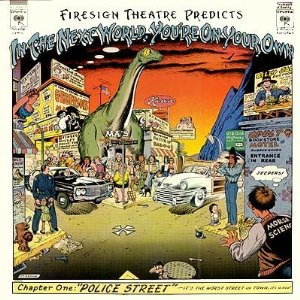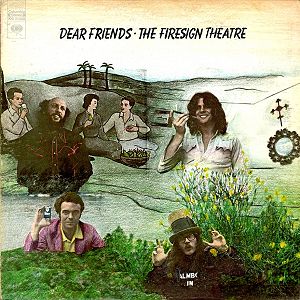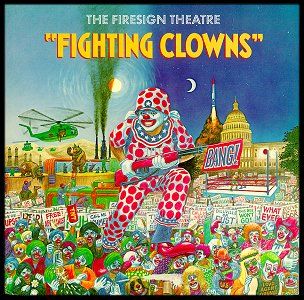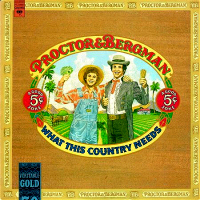
The Firesign Theatre was an American surreal comedy troupe who first appeared on November 17, 1966, in a live performance on the Los Angeles radio program Radio Free Oz on station KPFK FM. They continued appearing on Radio Free Oz, which later moved to KRLA 1110 AM and then KMET FM, through February 1969. They produced fifteen record albums and a 45 rpm single under contract to Columbia Records from 1967 through 1976, and had three nationally syndicated radio programs: The Firesign Theatre Radio Hour Hour [sic] in 1970 on KPPC-FM; and Dear Friends (1970–1971) and Let's Eat! (1971–1972) on KPFK. They also appeared in front of live audiences, and continued to write, perform, and record on other labels, occasionally taking sabbaticals during which they wrote or performed solo or in smaller groups.

Don't Crush That Dwarf, Hand Me the Pliers is the Firesign Theatre's third comedy album, released by Columbia Records in July 1970. In 1983, The New Rolling Stone Record Guide called it "the greatest comedy album ever made". It was nominated for a Hugo Award for Best Dramatic Presentation in 1971 by the World Science Fiction Society. In 2005, the US Library of Congress added the album to the National Recording Registry and called the Firesign Theatre "the Beatles of comedy."

I Think We're All Bozos on This Bus is the fourth comedy album made by the Firesign Theatre for Columbia Records, released in August 1971. In addition to standard stereo formats, the album was released as a Quadraphonic LP and Quadraphonic 8-Track. It was nominated for a Hugo Award for Best Dramatic Presentation in 1972 by the World Science Fiction Society.

Waiting for the Electrician or Someone Like Him is the first comedy album recorded by the Firesign Theatre. It was originally released in January 1968 by Columbia Records.

David Ossman is an American writer and comedian, best known as a member of the Firesign Theatre and screenwriter of such films as Zachariah.

"The Adventure of the Sussex Vampire", written by British author Arthur Conan Doyle, is one of 12 Sherlock Holmes stories collected between 1921 and 1927 as The Case-Book of Sherlock Holmes. It was first published in the January 1924 issues of The Strand Magazine in London and Hearst's International in New York.

Everything You Know Is Wrong is the eighth comedy album by the Firesign Theatre. Released in October 1974 on Columbia Records, it satirizes UFO conspiracy theories and New Age paranormal beliefs such as Erich von Däniken's Chariots of the Gods and claimed psychic Uri Geller, which achieved wide public attention by that time.

Proctor and Bergman was a comedy duo consisting of Philip Proctor and Peter Bergman. The two started performing in 1973 while taking a break from the four-man comedy act The Firesign Theatre, with the comedy album "TV or Not TV", on which they based a short film in 1978. They reunited the Firesign Theatre in 1974, but resumed their duo act in 1975 during a second temporary split of the Firesigns, and continued to perform as a duo during several breaks of the Firesign Theatre until Bergman's death in 2012.

In the Next World, You're on Your Own is the ninth and last comedy album recorded by the Firesign Theatre for Columbia Records. It was released in October 1975.

Dear Friends is the Firesign Theatre's fifth album to be released on Columbia Records. It is a compilation album, collecting the Firesigns' choice of the best comedy sketches from their nationally syndicated radio program produced from September 1970 to February 1971.

Not Insane or Anything You Want To is the sixth album released by the Firesign Theatre on Columbia Records. It was released in October 1972 and includes some material that was recorded in the studio as well as some material that was recorded before a live audience. The full title is listed on the spine of the record album as Not Insane or Anything You Want To. The abbreviated title Not Insane appears on the front of the album cover, while Or Anything You Want To appears on the back cover. It is usually referred to simply as Not Insane.

Papoon for President is a comedy compilation album released in 2002 by the Firesign Theatre. George Papoon is a fictional US Presidential candidate invented by the group in 1972 for their filmed radio broadcast Martian Space Party, in which Papoon is nominated as the candidate of the "Natural Surrealist Party". The album is a compilation of material originally released in the film and the 1972 album Not Insane or Anything You Want To, plus material from 1976 and 1980. The first and last tracks contain interviews of Phillip Proctor and Peter Bergman done by Steve Marshall, broadcast on NPR both before and after the 1972 United States presidential election. These interviews were released on a promotional recording, A Firesign Chat with Papoon, by Columbia Records in November 1972.

TV or Not TV is the debut album by the comedy duo Proctor and Bergman. It was originally released in 1973 by Columbia Records.

Forward Into the Past is a 1976 compilation album by the Firesign Theatre. It presents the "Greatest Hits" from their nine Columbia albums and includes two tracks that were previously released only on a single.

Just Folks... A Firesign Chat is a 1977 comedy album by the Firesign Theatre. The material is based on previously unreleased material from their 1970–1972 radio shows Dear Friends and Let's Eat!. It was the only record the group made under a new contract with Butterfly Records, after the cancellation of their ten-year Columbia Records contract.

Fighting Clowns is a 1980 album by the Firesign Theatre. It is unique among Firesign Theatre albums because it is primarily made up of songs rather than the group's usual audio theater or sketch comedy pieces. Many of the songs on this album were recorded live in front of an audience while some of the songs and much of the linking material was recorded in the studio. Cover artwork was done by Phil Hartman.
Many writers make references to Sir Arthur Conan Doyle's famous literary creation, the detective Sherlock Holmes, and these often become embedded within popular culture. While Holmes exists predominately in the context of Victorian-era London, he has been mentioned in such outre contexts as the 22nd century or hunting aliens or supernatural enemies. These references are in addition to the innumerable passing references to Sherlock Holmes made in many literary and cinematic works, such as the labeling of a person as a "Sherlock", whether in reference to their intelligence.

Radio Now Live is a 2001 comedy album by the Firesign Theatre, recorded from a live performance on a 1999 West Coast tour. Its main concept is based on material from Firesign's studio album Give Me Immortality or Give Me Death, but also contains material based on older albums How Can You Be in Two Places at Once When You're Not Anywhere at All; Don't Crush That Dwarf, Hand Me the Pliers; I Think We're All Bozos on This Bus; and Anythynge You Want To.

What This Country Needs is the second comedy album by the duo Proctor and Bergman of the Firesign Theatre. It was originally released in September 1975 on Columbia Records, and was among the Firesign Theatre's last Columbia albums, along with In the Next World, You're on Your Own and Forward Into The Past. It was recorded from a live performance at The Bottom Line which contained material adapted or re-used from their 1973 studio album TV or Not TV, plus several new sketches.


















